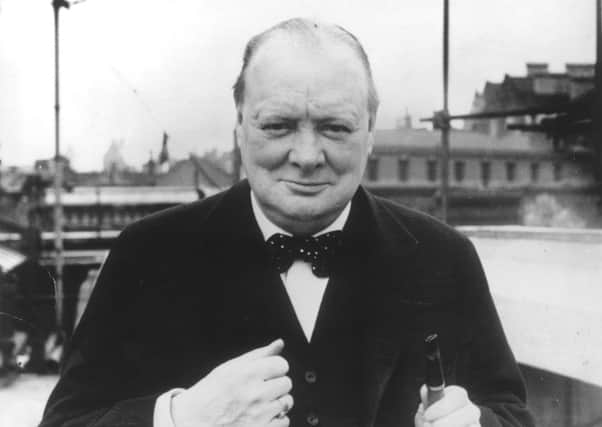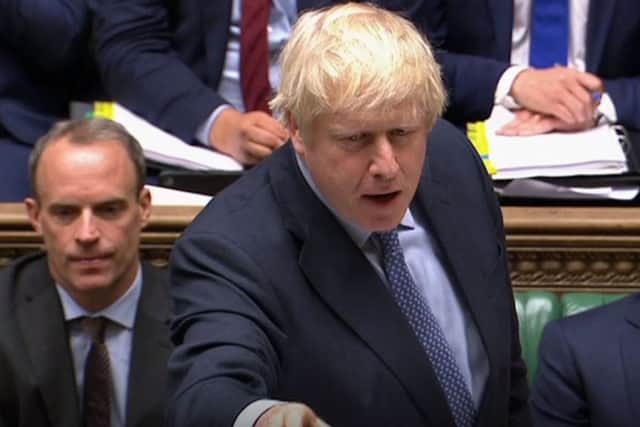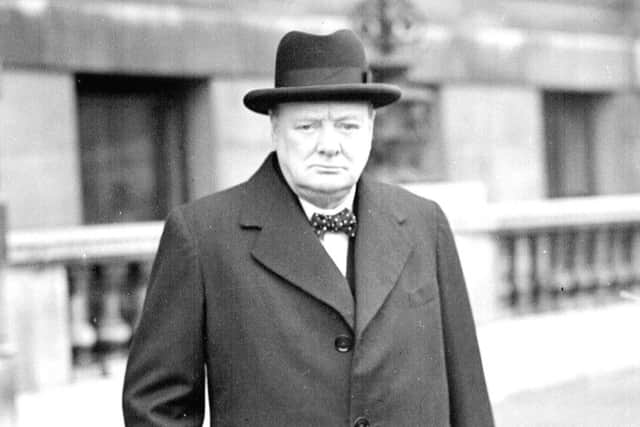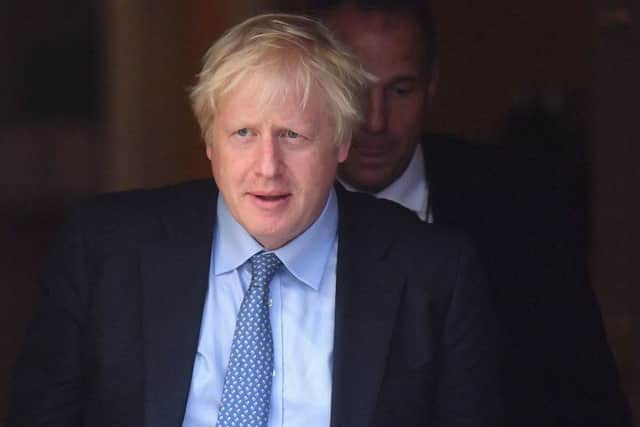I’ve news for Boris Johnson: you’re no Winston Churchill and here’s why – Tom Richmond


As Prime Minister, he’s clearly been copying Churchill’s mannerisms – the hunched look and deliberate pauses for effect in speeches. The cigar and bow-tie will follow if there are enough votes in it.
And while Churchill came to power when Britain faced humiliation in the Second World War, Johnson views his defining mission – Brexit – with a similarly singular steadfastness.
Advertisement
Hide AdAdvertisement
Hide Ad

Yet, while both were wordsmiths and historians, I have news for Boris Johnson following his second visit to Yorkshire as PM – you are no Winston Churchill.
For, while Brexit is a mere ripple compared to the horrors that began 80 years ago this week, Churchill would, I presume, be horrified at how Johnson uses the language of war – like Jeremy Corbyn’s “surrender bill” – to stir division and risk fuelling narrow nationalism in times of peace. By contrast, the former’s oratory united and galvanised.
Advertisement
Hide AdAdvertisement
Hide AdAnd while Johnson’s resolution over Brexit appears driven by Churchill’s resolution in the Second World War, the similarities end here.


Churchill led a very effective wartime coalition while Johnson finds himself, six weeks after taking office, pressing for an election that he did not want to call before Britain leaves the EU on October 31.
He began his Commons statement on Tuesday with a majority of one. He ended it with a minority government after a defection. And after the purge of 21 former Ministers, and grandees, who backed the so-called Brexit Delay Bill, his current majority of minus 42.
Advertisement
Hide AdAdvertisement
Hide AdThis is because he miscalculated reaction to the suspension of Parliament ahead of his ‘do or die’ Brexit deadline and then compounded it by expelling the Tory rebels – mainstream MPs with over 350 years of Commons experience.


Leaving aside Johnson’s own disloyalty towards his predecessor, he did – until a week ago – appear to be an electoral asset whose bullishness was re-energising a Tory party left fatigued by Theresa May’s dourness. Now he risks becoming a liability in danger of becoming the shortest-serving PM in history – George Canning was in office for just a 119 days – because his brazenness and lack of trustworthiness is so repulsing the silent majority who will the next election’s outcome.
Advertisement
Hide AdAdvertisement
Hide AdHis intolerance of opponents, and propensity for intemperate language with regard to ethnic minorities amongst others, is bringing the office of Prime Minister into disrepute. Churchill would never have called the leader of the Opposition “a chlorinated chicken” – or “big girl’s blouse” – as Johnson did. True statesmen never resort to personal mockery for fear of revealing weakness.
But Johnson’s approach is even more perplexing because Parliamentary sovereignty was a key argument in the 2016 EU referendum – and it also betrays Churchill’s definition of a MP’s duty.
“The first duty of a member of Parliament is to do what he thinks in his faithful and disinterested judgment is right and necessary for the honour and safety of Great Britain,” he set out in the 1950s. “His second duty is to his constituents, of whom he is the representative but not the delegate. It is only in the third place that his duty to party organisation or programme takes rank. All these three loyalties should be observed, but there is no doubt of the order in which they stand under any healthy manifestation of democracy.”
Why does this matter? Though Churchill values loyalty, he respects the right of MPs to make individual judgments – something that MPs on all sides of the Brexit debate are doing. To suppress dissidents, as Johnson has done, counters this doctrine. Churchill’s definition also gives credence to those MPs whose stance on Brexit is at odds with how their constituents voted.
Advertisement
Hide AdAdvertisement
Hide AdAnd, though not implicitly, it also encourages civilised debate – something Johnson has not done. Yes, Labour, too, cannot speak with moral authority on the conduct of politics when it is besmirched by anti-Semitism, but this PM can give the impression that proceedings are a joke.
They’re not. The future of a divided country is at stake and Johnson’s bolshiness – which distracts from his serious policy agenda for the North – is doing himself no favours at a time when he is expecting the electorate’s endorsement.
Perhaps he, and all election candidates, will now heed the words of a respected Parliamentarian shamefully and summarily deselected this week by the Tories after 37 years of loyal service.
“I am truly very sad that it should end in this way,” they said with Churchillian candour while holding back the tears. “It is my fervent hope that this House will rediscover the spirit of compromise, humility and understanding.” Who made these remarks? Sir Nicholas Soames – the grandson of Boris Johnson’s great hero Winston Churchill. Enough said.